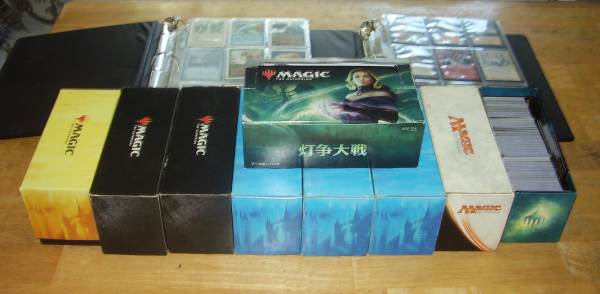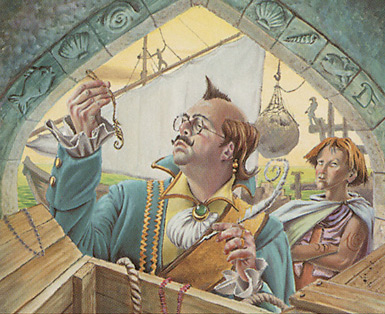Are you a Quiet Speculation member?
If not, now is a perfect time to join up! Our powerful tools, breaking-news analysis, and exclusive Discord channel will make sure you stay up to date and ahead of the curve.
I have acquired the vast majority of my personal Magic collection through buying the collections of others. I am confident that it maximizes dollar value; especially if you collect, play, trade, and sell.
The Who and How
At some Local Game Stores (LGSs) that I frequent that are NOT primarily Magic shops, players know that I am "the guy." Among my friends and personal associates, everyone knows that I am always buying Magic. If you become "the guy" you will have a steady stream of people coming to you with the intention to sell; this is the best "job" you can possibly have!
2014 was my biggest buying year—I purchased two million cards. Almost all of these were private collection purchases, but, I did buy out two stores—one that had been closed for a couple of years and another that was in the process of closing. If you are ever in the position to help a store close out, it can be a tremendous opportunity and a unique experience as well.
I am always on the lookout for new collections to purchase and I hope that I can show you some of the massive upsides to expanding your collection this way while also providing some insight to lower the overall costs of these types of purchases.

Set Expectations
The vast majority of collections are bulk cards. Bulk rares, bulk uncommons/commons, and basic land are almost always 99% of what is there. For a collection of 3,000 cards that means there could be about 30 cards of significant value and 2,970 cards of almost zero value. Has the seller done the work for you, sorting all their valuable cards and being clear with what kind of value they expect? If so, great. Settle on a price for their valuable cards and bulk the rest. Sounds so easy, buying collections must be like this every time right?
No, heavens, no.
I don't want to disparage the typical Magic seller, but, it's not a fun or reasonable experience. So where do we find sellers who are reasonable?
The Lifecycle of a Magic Player
The absolute most important of these rules is understanding the seller. I make sure that the seller is done playing Magic. No one can afford to pay for "sentimental value" because it is not attached to "dollar value." If the seller wants to keep one or two decks—ALWAYS see these decks. Without exception, the best cards in the entire collection seem to end up right there. If they insist on keeping their best cards, that's fine, just remember it should be reflected in your willingness to buy. I truly want all the cards and if they are through playing Magic they should be ready to let go.
It is that simple—the best collections come from players who are finished playing. I generally avoid purchasing from anyone else for every reason possible. As the buyer, you have all the "power" in the transaction. Believe me, there is no end to the number of collections you can buy. Unless the seller is a former Wizards employee or store, it is unlikely they have something once in a lifetime. Even in the rare case that the seller does have something great, do they have something amazing at an unbeatable price? You can pay two mana for a Grizzly Bears or two mana for a Tarmogoyf every single day—don't spend four mana for a bear or five mana for a Goyf!
Condition Matters
Keep in mind it's unlikely you will thoroughly inspect every single card in a collection unless it is very small or high-end. Cards often have hidden damage. The amount of time it would take to inspect 1,000 cards is quite high and generally not worth doing; most average collections are two to three times that size. Do you really care if a Crimson Vow non-full art regular Forest is in near mint condition? The answer is no, but also, it is yes!
Point out the condition of every single card that has any kind of defect whatsoever. Make sure that the seller is aware that condition matters! Every vendor has the same caveat when they are buying bulk: "These prices reflect 1,000 near mint cards." Make sure you operate the same way.
For chase cards or older vintage cards, the condition is twice as important. Generally, buyers fall into two camps. Some want the absolute best condition, most expensive top-end printing of a card aka "collectors." Others want the least expensive version of a tournament playable card aka "players." In each case, condition matters! MP cards tend to be the toughest sale as they are neither the cheapest nor the best condition; point this out! It's also very easy when looking at a long box of cards to check for significant edge wear or discoloration on the corners and sides of cards and this takes just a second of scanning to save you time and money.
Organic VS Inorganic
Most MTG collections range from 1,000-3,000 cards with 3,000 as a rough average. In the grand history of Magic, you primarily purchased packs of 15 cards with one rare. A collection of 3000 cards bought in 15 card packs would require 200 packs of cards to achieve; thus I am expecting right around 200 rares in an organic collection of that type. Additionally, at $3.99 a pack, the seller may have paid $800 for their cards. They may expect that, no matter what they actually have, their collection has significant value because of how much they paid.
Granted, there are so many ways to buy new cards today that these old ratios have shifted, but the idea is still true. If a 3,000 card collection has more than 200 rares that means the seller has likely added significantly to the average value of the collection and you should be more interested. If there are far fewer than 200 rares that's generally a sign that they have sold off much of the value. Obviously, if you detect 200 bulk rares with zero mythic rares, and few if any foils, this collection is "inorganic" and likely to be avoided unless bulk pricing is accepted.
Quantity is a Quality All Its Own
For me, a "huge" collection is about 30,000 cards or larger. Organic collections at this quantity are fairly rare. When presented with large quantity buying opportunities it's always better to be cautious because it takes several hours to go through every card. Purchasing bulk cards at around $6/thousand is not a very rare opportunity. If the seller does not have rares/foils/etc sorted then check one or two boxes, thoroughly, skim the remaining cards and assign a bulk value based on that.
Only once have I purchased a couple of long boxes without taking a look through everything because they only wanted $10; in these cases, nearly one entire 1,000 count box was just basic lands of no significant age or value, but, all the cards were in pristine near mint condition which I saw right away from perfect, clean white borders. For the cost of the long boxes and a couple of other alright cards in the other box, I did not risk much.
While I have found many good cards worth tens or dozens of dollars this way, I have never found anything of massive value in collections like this, and I have been doing this for many years. Never buy based on hope, only buy based on value. They may have lots of cards, but, they generally do not have lots of value.
The Ceiling and the Floor
For me bulk pricing is the floor and, generally, I am offering between two to three times bulk rates on a given unsorted collection unless the condition is an issue. The ceiling is definitely far more variable but I have mentioned that, for me, unless a collection is dripping with low cost, mint condition, vintage cards I do not want to invest a lot in reprintable, modern, cards.
Many years ago my rule was very different—I would never pay more than the cost of a Revised dual land for a collection unless it had Revised dual lands or better. Nowadays the market is different and the rules have changed. The more expensive a collection is, the greater a deal I want to get, percentage-wise. A recent example was purchasing a collection where the single most valuable card was Gravecrawler. Shortly thereafter it was reprinted in a Secret Lair. However, I did not overpay for the collection so, overall, it was still a home run. I am acutely aware of any purchase with significant amounts of modern cards that will inevitably be reprinted.
Don't overpay for cards! Especially cards that are likely to be reprinted. Set a ceiling and stick to it! There is always another collection just around the corner. FOMO is a dangerous thing, do not succumb to it!
What About Singles and High End Cards?
My experience buying high-end cards and singles tends to go poorly; in most cases, I feel I can purchase the same card for less elsewhere. One extremely useful guide is the MTG Sick Deals Facebook Group. Here you can purchase cards for 10% discounts off eBay and TCGLow every single day of the week. For me, that is the starting price for singles negotiations. The only time I pay "market price" for a card I need is when a tournament is a few days away. Additionally, I've gotten so much value purchasing entire collections that buying single cards, unless at a considerably discounted price, is just inefficient for me. I get more bang for my buck buying everything, and I do mean everything!
To put this another way, if you overpay for singles, you have less of a bankroll to finance your collection buying activities. If you can get great deals on singles, awesome, go for it! For everyone else, collections seem to just offer significantly better value; and not just monetary value!
Swag and Entertainment Value
Many people consider that breaking down and searching a collection takes considerable time; for me, it can save time and add value. Not only do you get a huge inventory of new cards to sell but also draft, do sealed, and get ideas for new decks to build. When I was working on three different Commander decks, rather than pulling those cards from my collection, I spent time sorting and buylisting cards. While doing that I pulled many of the cards I needed straight from purchased collections and, thus, saved some time!
Additionally, everyone loves accessories. Dice, sleeves, binders, deck boxes, and mats can all be fairly valuable addons for either resale or acquiring them without paying full price; thanks to buying entire collections I have not had to buy any accessories for years.
Finally, the Ion Scanner has saved me a ton of time and it has made the entire process significantly easier. Time is money and saving that time is worth every penny.
Four Collections Purchased This Year
I've briefly touched on general collection buying in this article. Next week, I will go over the four collections I have purchased already in 2022. They are very different in terms of size, content, price, how they were purchased and who the sellers were. I will also touch on some of the challenges of collection buying and pitfalls that I encountered with these specific buys.




